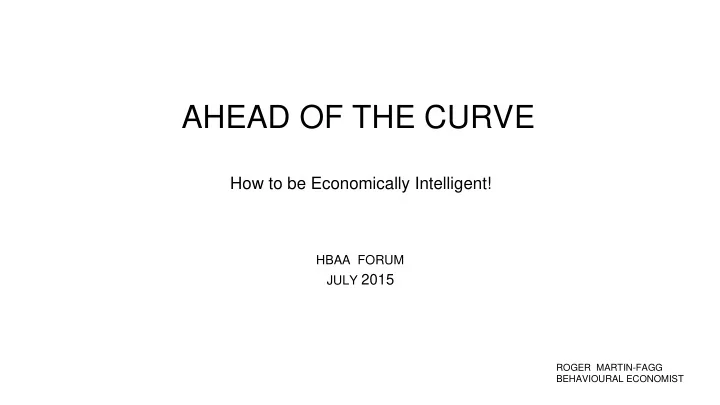

AHEAD OF THE CURVE How to be Economically Intelligent! HBAA FORUM JULY 2015 ROGER MARTIN-FAGG BEHAVIOURAL ECONOMIST
SALES REVENUE subtract ALL PAID INVOICES = PROFIT AFTER TAX AND INTEREST WAGES AND SALARIES + This is Nominal Gross Domestic Product (GDP) 65-90% produced by businesses employing fewer than 200 people in most countries.
Worth £39Bn 70% take place in London 28% of overseas visitors are for business 73% from Europe Remarkably stable proportion over past 5 years
SHORT RUN ECONOMIC ACTIVITY is driven by the flow of spending MONEY VELOCITY NOMINAL GDP multiplied by = 95% manufactured by Determined by commercial banks interest rates, the media, the weather, house prices but above all CONFIDENCE Banks manufacture money when they make a loan(bank credit)and can destroy money when a loan is paid down.
Nominal GDP and broad money ( sterling bank deposits) growing in line but not credit (bank lending). This is the effect of QE and higher Velocity.
Austerity not caused by Government Between 2010 and 2015 UK banks destroyed £350Bn
The B of E will require 4.05% ratio by 2019: this will reduce leverage from 33x today to 25x Basel 3 33x manufactured B of E money 25x
Household consumption rising steadily thanks to 22Bn payout by banks for mis-selling and the growth in unsecured lending (up 10%)
UK consumer spending has been above last 3 years trend for past 12 months. It will continue.
The household saving ratio has fallen (a) Percentage of household post-tax income. (b) Percentage of household post-tax income excluding income flowing into employment-related pension schemes.
CPI CPI CPI Source: Experian
Companies’ gross margins have been broadly unchanged over the past year
The cash position of private non-financial companies is improving (a) Monthly data unless otherwise specified. (b) Quarterly data. Intermediate other financial corporations (OFCs) are: mortgage and housing credit corporations; non-bank credit grantors; bank holding companies; securitisation special purpose vehicles; and other activities auxiliary to financial intermediation. Sterling deposits arising from transactions between banks or building societies and other financial intermediaries belonging to the same financial group are also excluded, quarterly prior to June 2010 and monthly thereafter. (c) M4 excluding intermediate OFCs, quarterly prior to June 2010 and monthly thereafter.
Significant upturn in business investment growth (a)(b)
GDP and sectoral output (a)
Q2
Percent % 120 12 Constant US$ Real Price of Oil End of Iranian per barrel Iranian World real hostage crisis revolution economic growth 100 10 OPEC cuts production 2015-2017 floor price $50 80 8 OPEC Invasion cartel of Kuwait collapses 60 6 Start of second war in Iraq Average growth rate in real GDP, 1970-2004: 3.7% 40 4 R E C E S R S E 20 2 I C O E n S Stag- Boom Growth Growth S flation I O
UK real house price growth
Indicators suggest housing remains more affordable than in the run-up to the crisis The B of E want to maintain this level The driver of interest rates is the rate of wage growth: there will be no increase until wages ( as distinct from earnings) are growing above 3%
No change in interest rates until mid 2016 then gradual increases to a max of 2.75% by 2020 House prices up 3-5% per annum, no boom Wages will grow 3% All UK businesses with a distinctive and compelling offer will enjoy significant growth GDP will grow 2.5-2.8% 5 years of steady, low inflation growth until 2020 when the next slowdown will begin!
An increase in US interest rates (will slow global growth) Oil back to $100 ( unlikely) Chinese military aggression in South China Sea following poor economic growth ISIL ( risk unknown) The UK decides to leave the EU
It will increase net taxes by £ 6.5Bn per year by 2020 It will limit public sector wage rises to 1%pa It will require employers of those aged over 25 to pay the living wage: worth £4bn Changes is welfare payments amount to £12Bn, this will mostly impact on the working poor The overall impact will be to reduce real GDP by 0.1% each year
The Budget has been designed to reduce the Government deficit, whilst maintaining pension increases each year Your primary residence is now free of all taxes up to £1million value
The hospitality industry is one of the low payers: the living wage will require increases in efficiency through innovation, until then margins will be lower The reduction in corporation tax will allow successful operators to keep more of their profit ( and the increase in tax on dividends should prompt greater profit retention to finance investment) Despite all this, 5 very good years of growth is in prospect ENJOY!
Recommend
More recommend